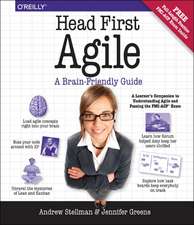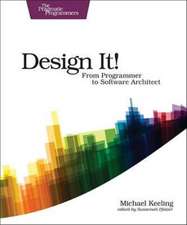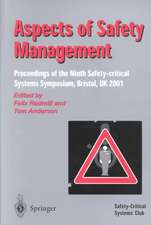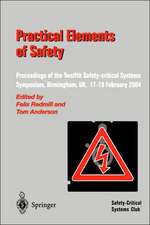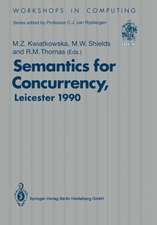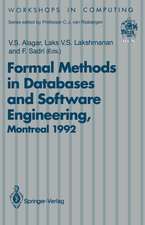Life Cycle Management For Dependability
Prefață de T. Anderson Editat de Felix Redmill, Chris Daleen Limba Engleză Paperback – 17 apr 1997
Preț: 643.50 lei
Preț vechi: 804.37 lei
-20% Nou
Puncte Express: 965
Preț estimativ în valută:
123.15€ • 128.09$ • 101.67£
123.15€ • 128.09$ • 101.67£
Carte tipărită la comandă
Livrare economică 14-28 aprilie
Preluare comenzi: 021 569.72.76
Specificații
ISBN-13: 9783540760733
ISBN-10: 3540760733
Pagini: 256
Ilustrații: XVIII, 235 p. 5 illus.
Dimensiuni: 155 x 235 x 13 mm
Greutate: 0.36 kg
Ediția:Softcover reprint of the original 1st ed. 1997
Editura: SPRINGER LONDON
Colecția Springer
Locul publicării:London, United Kingdom
ISBN-10: 3540760733
Pagini: 256
Ilustrații: XVIII, 235 p. 5 illus.
Dimensiuni: 155 x 235 x 13 mm
Greutate: 0.36 kg
Ediția:Softcover reprint of the original 1st ed. 1997
Editura: SPRINGER LONDON
Colecția Springer
Locul publicării:London, United Kingdom
Public țintă
Professional/practitionerDescriere
Dependability has always been an vital attribute of operational systems, regardless of whether they are highly-specialised (like electricity generating plants) or more general-purpose (like domestic appliances). This volume provides a highly-readable overview of the topic, concentrating on dependability as a life-cycle management issue rather than as a technical subject. Specifically avoiding technical language and complex mathematics, it is designed to be accessible to readers at all levels. It will be of particular interest to project managers and software engineers in industries where dependability is of particular importance, such as aerospace, process control, and mining. It will also provide useful reading material for students taking courses with modules in dependability. Felix Redmill and Chris Dale have both worked in industry for over 15 years, and now run successful consultancy businesses.
Cuprins
1 This Business of Dependability.- 1.1 Introduction.- 1.2 Defining Dependability.- 1.3 Users’ and Society’s Needs for Dependable Systems.- 1.4 Some Failures of Systems Which Should Have Been Dependable.- 1.5 Achieving and Assessing Dependability.- 2 Getting the Culture Right.- 2.1 Introduction.- 2.2 Factors Affecting Organisational Performance.- 2.3 So What is Culture?.- 2.4 Characteristics of a Dependability Culture.- 2.5 What Happens if We Get It Wrong?.- 2.6 Developing the Right Culture.- 2.7 Final Remarks.- 3 Policy and Planning for Dependability.- 3.1 Introduction.- 3.2 Definitions.- 3.3 Compilation and Presentation.- 3.4 General Contents.- 3.5 Specific Content for Individual Life-cycle Phases.- 3.6 Summary.- 4 Measurement and Assurance.- 4.1 Introduction.- 4.2 Software Project Management and Management Challenges.- 4.3 Simple Process Measures.- 4.4 Refining the Measures.- 4.5 Best Practice.- 4.6 Use of the Measures.- 4.7 Assurance.- 4.8 Conclusions.- 5 Third Generation Project Management.- 5.1 The Challenge for Project Management.- 5.2 What is Project Success?.- 5.3 What Makes Projects Fail?.- 5.4 The Essential Elements of Project Management.- 5.5 The Characteristics of Successful Managers.- 5.6 A Final Note.- 6 Operations Management for Dependability.- 6.1 Introduction.- 6.2 Trends in Computer-related Systems.- 6.3 Incidents and Insights into Dependability.- 6.4 Organisational Structure, Management and Competence.- 6.5 Documentation, Including Operating Instructions.- 6.6 Contingency Planning.- 6.7 Security and Access Control.- 6.8 Hand-over Approval for Live Operation.- 6.9 Training.- 6.10 Preventative Maintenance and Calibration.- 6.11 Repair, Modification and Change Control.- 6.12 Reviewing Operations.- 6.13 Decommissioning from Live Operation.- 6.14 Regulation.- 6.15 Lessons and the Future.- 7 Managing Maintenance and Change.- 7.1 Introduction.- 7.2 Some Principles.- 7.3 Levels of Approval.- 7.4 Management Responsibilities.- 7.5 The Maintenance Cycle — The Maintenance and Modification Management Model.- 7.6 Revalidation and Configuration Management.- 7.7 Maintenance of System Architectures for Dependability.- 7.8 Engineering Aspects.- 8 Practical Risk Management.- 8.1 Introduction.- 8.2 What is Risk?.- 8.3 Risk Management Goals.- 8.4 Uncertainty and Risk.- 8.5 A Simple Approach.- 8.6 The Management of Risk.- 8.7 Tolerable Risk and the ‘ALARP’ Principle.- 8.8 A Simple Tool for Risk Analysis.- 8.9 Action Plans Against Risk.- 8.10 Beware of Underestimating Risk — Three Laws.- 8.11 Final Remarks.- References.











